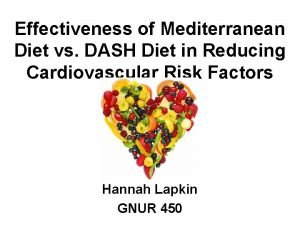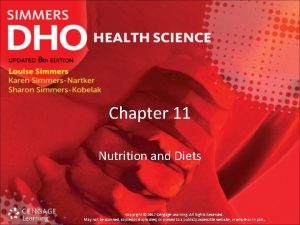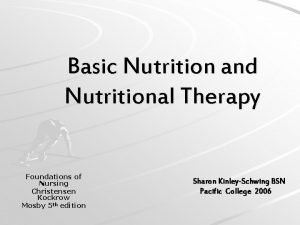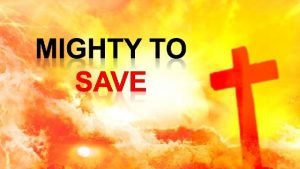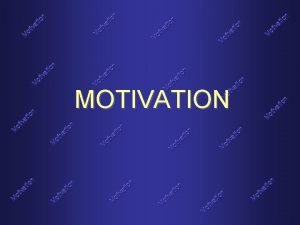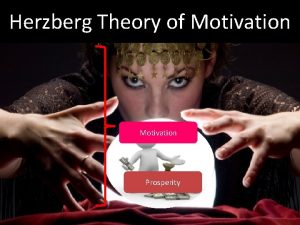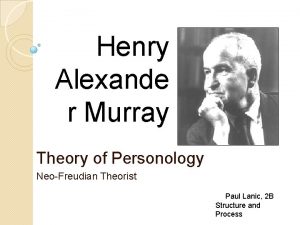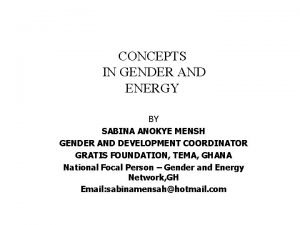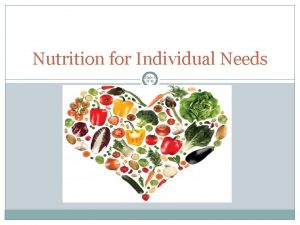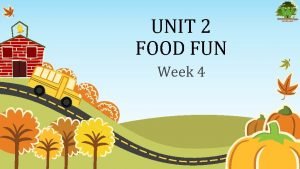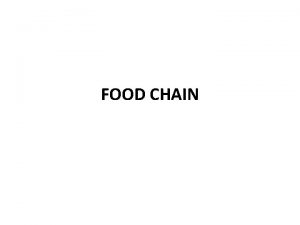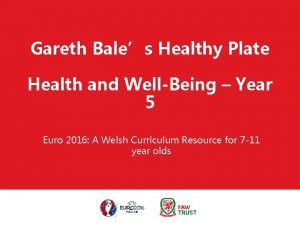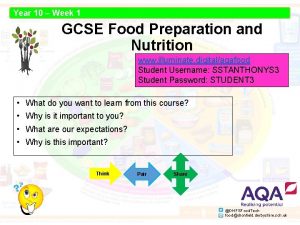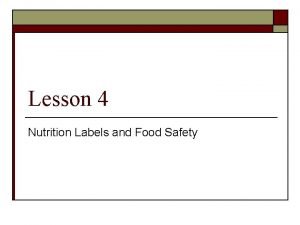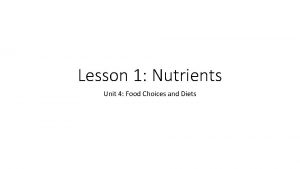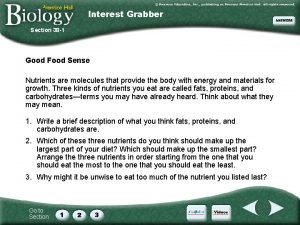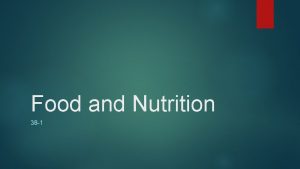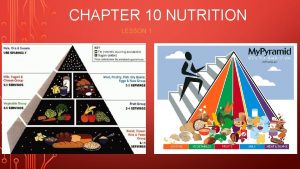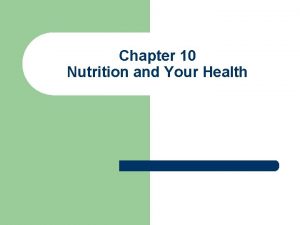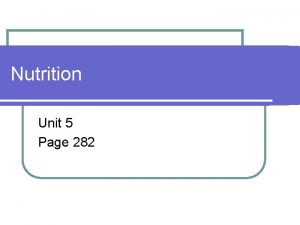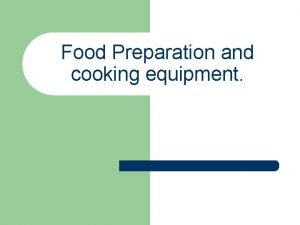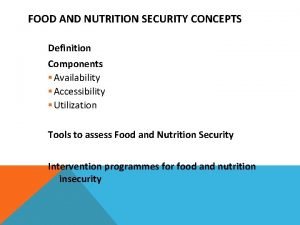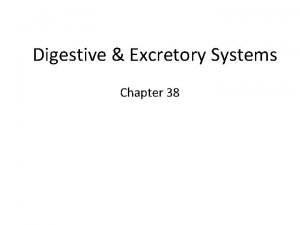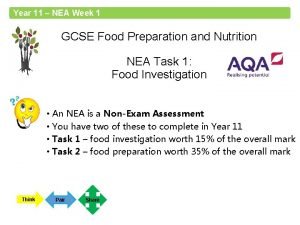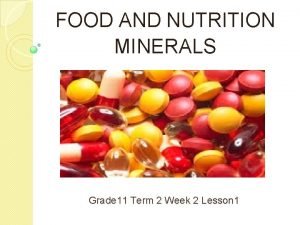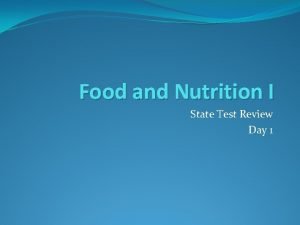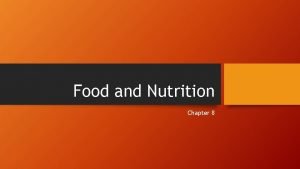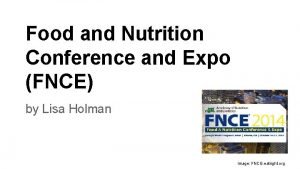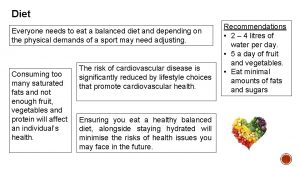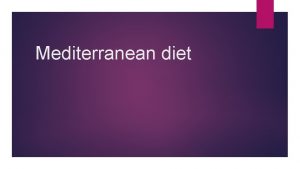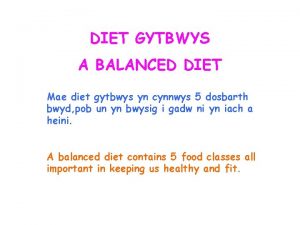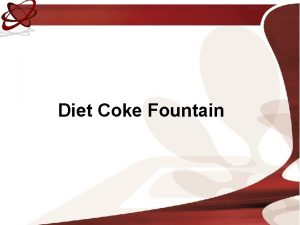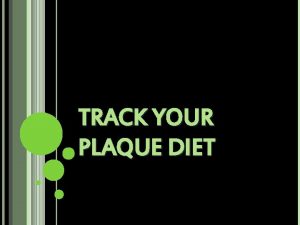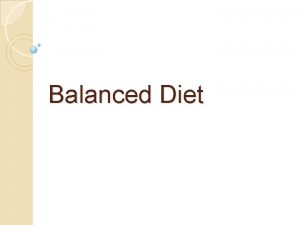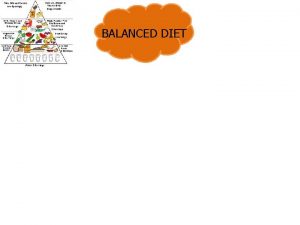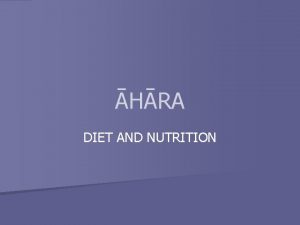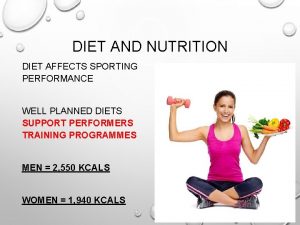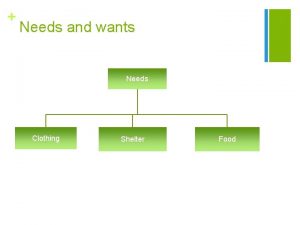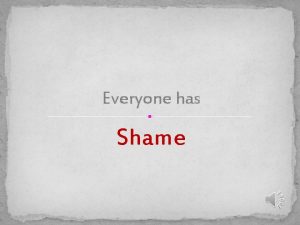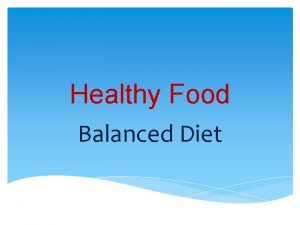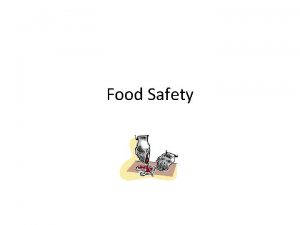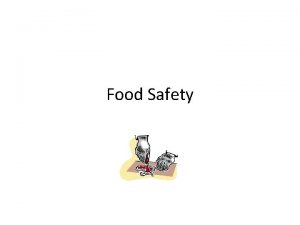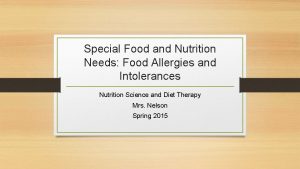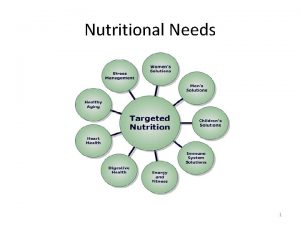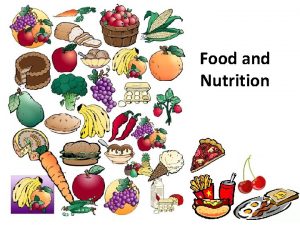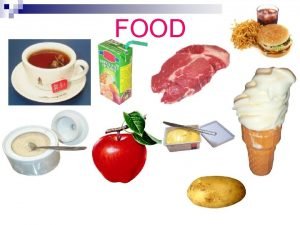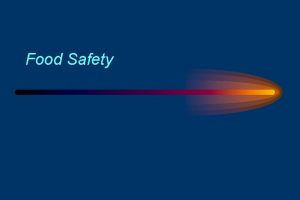Nutrition and Diet Nutrition n Everyone needs food



































- Slides: 35

Nutrition and Diet

Nutrition n Everyone needs food to survive. Food provides the body with energy and nutrients. n Food is our main source of energy. It fuels all the energy needed for all the different activities we carry out.

Why do we need FOOD? n Growth n Repair n Energy n Good Health


What is a balanced diet? SEVEN Essential Components n Carbohydrates n Fats n Proteins n Vitamins n Minerals n Fibre n Water


Nutrients in Food n Carbohydrates n Fats n Proteins n Vitamins n Minerals

Water and Fibre n Water is essential for life. n Dietary fibre is also needed to keep the digestive system in good working order.

Why water? Water is a means of transport for: Ø Nutrients Ø Waste Ø Hormones

Carbohydrates Give us the energy we need for our working muscles. n Although we can also get energy from fat, carbohydrates release energy more quickly and more efficiently. n

Carbohydrates Small amounts are stored as glucose in our blood. n If it is not needed immediately, it is stored as glycogen in our liver and muscles. n



Carbohydrate Loading n n n Carbohydrate loading is particularly useful to marathon runners, cyclists & long distance swimmers. n n A technique whereby athletes train very hard before an event whilst reducing their carbohydrate intake. Their glycogen stores are so used up. A few days before the event, they switch to light training and eat lots of carbohydrates. The muscles store more energy than normal. Energy levels last longer.

Fats Give us energy although much more slowly than carbohydrates. n Fats need extra oxygen supplies to provide energy. They are the main source of energy when sleeping or resting. n They help to keep the skin in good condition, help to keep us warm and protect our vital organs. n

Fats Food with a high fat content contains fatsoluble vitamins. Extra fat is stored just under the skin. n Too much fat is detrimental to sports people and can lead to high cholesterol levels. Cholesterol is found in the blood and is present in many fatty animal products. n

Fats Saturated § Found in animal products such as milk, meat, cheese, cream and butter. They are also found in cakes, biscuits and chocolate. Unsaturated § Found in fish and plant products such as corn, nuts and soya beans.

Proteins Much of our body tissue is made up of protein, including skin, bones and muscles. n Proteins are needed for growth, repair and efficient working of our tissues. n Proteins are also needed to make enzymes (chemicals produced in cells which speed up the rate of certain chemical reactions) and hormones. n

Proteins n Proteins are made from building blocks called amino acids. n There are TWO types of amino acids: Ø Non-essential amino acids Ø Essential amino acids

Amino Acids n Non-essential amino acids n Essential amino acids v The body needs 21 different amino acids and the body can make 13 of these, which are called non-essential amino acids. v The remaining 8, which we need to take in from food. These are found in both animal and plant foods.

Vitamins Enable our bodies to work well and efficiently. • They regulate the chemical reaction of our body. • They help in the growth and repair of our bodies' tissues (bones, skin, teeth & glands). •

Vitamins They help in the working of our muscles and nerves and in the release of energy from our food. • They are also efficient in resisting bacteria and disease. •

Vitamins q Our bodies cannot make vitamins so vitamins must be supplied from the food we eat. Vitamins are needed in small amounts but are essential for good health. q There are 2 types of vitamins: Ø Water-soluble Ø Fat-soluble

Water Soluble Vitamins n B group and vitamin C. These cannot be stored in our body and so need to be supplied daily. n Any excess of these vitamins is removed.

Fat Soluble Vitamins n A, D, E & K. These can be stored in the body.

Vitamins n Vitamins are found in a wide variety of fruits and vegetables so a balanced and varied diet ensures that the body consumes the appropriate amounts of vitamins required. Sports people may have slightly greater needs for certain vitamins. Many vitamins are destroyed when food is cooked or processed. n Vitamin supplements are not required if a balanced and varied diet is consumed. n

Minerals Enable the body to work well and efficiently. n Minerals are found in a large variety of foods - calcium in milk, cheese, yoghurt and bony fish (mackerel), iron in meat, liver, eggs, dark green vegetables (spinach) and potassium in bananas. n Too much of some minerals can be harmful - sodium in the form of salt can cause increased blood pressure, while mineral deficiency can cause stunted growth, damaged eyesight or weak, malformed bones. n

Minerals need to be consumed through the food we eat since the body does not make them. There are three types of minerals: n Macro minerals - these are needed in large amounts such as calcium n Trace elements - these are needed in small amounts such as zinc n Electrolytes - these are mineral salts found in our body fluids n

Functions of Minerals Mineral Calcium Iodine Iron Function Strengthens bones, helps blood to clot, strengthens muscles Helps the thyroid gland to promote normal growth and energy production Aids production of red blood cells, creates good skin tone, prevents fatigue, helps resistance to disease

Functions of Minerals Mineral Function Potassium Aids muscle contraction, promotes healthy skin, maintains normal blood pressure Sodium Maintains body fluid levels, aids muscle contractions

Minerals Zinc helps to build tissues. n Provide soluble salts in the body fluids and cells (sodium) to maintain the fluid balance in the body and encourage the correct functioning of the cells. n

Water Makes up ⅔ of a person's body weight and is essential for good health. It comes from the fluids and food we eat. n Water is lost through sweat, urine, expired air and faeces. The amount of water lost depends on: Ø Duration and intensity of exercise. Ø The temperature and humidity of surroundings. n

Water needs to be consumed to replace the water that is lost. Two liters of water need to be consumed everyday. A sports person needs to consume much more in order to avoid dehydration and maintain healthy. n Water is the main component of blood and cells. n Water helps to control our body temperature by absorbing heat produced n

Fibre Roughage or dietary fibre adds bulk to our food. This helps us to move the food through our digestive system and prevents constipation. n It helps to prevent bowel cancer. Fibre helps food absorption as it slows down the release of sugars from our body so that we get a more even release of energy. n

Fibre Dietary fibre adds bulk without adding extra kilojoules and so can help us lose weight if we need to. n Good sources of fibre include whole meal bread and pasta, brown rice, fruits and vegetables (especially where skin is eaten), nuts and seeds. n
 Dash diet vs mediterranean diet
Dash diet vs mediterranean diet Good afternoon, everyone.
Good afternoon, everyone. Cybersecurity and cyberwar: what everyone needs to know
Cybersecurity and cyberwar: what everyone needs to know Chapter 11 nutrition
Chapter 11 nutrition Chapter 11 nutrition and diets
Chapter 11 nutrition and diets Nutrition fundamentals of nursing
Nutrition fundamentals of nursing Forever author of salvation
Forever author of salvation Everyone needs compassion
Everyone needs compassion National board amazonweise yorktimes
National board amazonweise yorktimes Primary needs and secondary needs
Primary needs and secondary needs Primary needs and secondary needs
Primary needs and secondary needs Henry murray theory
Henry murray theory Strategic gender needs and practical gender needs
Strategic gender needs and practical gender needs Learning situation analysis
Learning situation analysis Nutrition for individual needs
Nutrition for individual needs Unit 2 food food food
Unit 2 food food food Grazing food chain diagram
Grazing food chain diagram Gareth bale meat
Gareth bale meat Illuminate aqa food
Illuminate aqa food Lesson 4 nutrition labels and food safety
Lesson 4 nutrition labels and food safety Food and nutrition unit 4
Food and nutrition unit 4 Section 38-1 food and nutrition
Section 38-1 food and nutrition Food and nutrition unit 4
Food and nutrition unit 4 Section 38-1 food and nutrition
Section 38-1 food and nutrition Chapter 10 nutrition for health lesson 1 answer key
Chapter 10 nutrition for health lesson 1 answer key Chapter 10 lesson 4 nutrition labels and food safety
Chapter 10 lesson 4 nutrition labels and food safety Usda food and nutrition service
Usda food and nutrition service Food and nutrition unit 5
Food and nutrition unit 5 Labour saving equipment in kitchen
Labour saving equipment in kitchen Food and nutrition security definition
Food and nutrition security definition Section 38-3 the excretory system
Section 38-3 the excretory system Food nea
Food nea Food and nutrition grade 11
Food and nutrition grade 11 Three sink method
Three sink method Chapter 8 food and nutrition
Chapter 8 food and nutrition Food and nutrition expo
Food and nutrition expo
